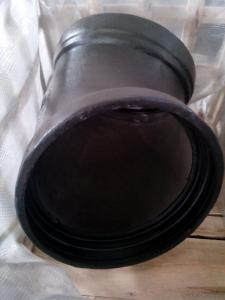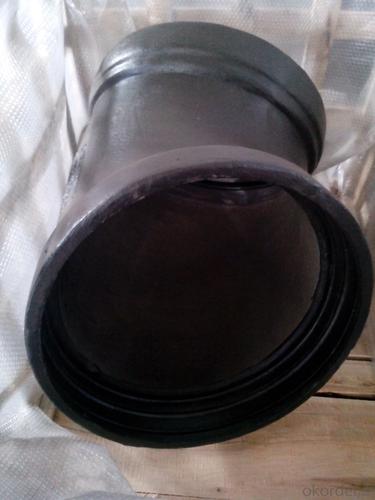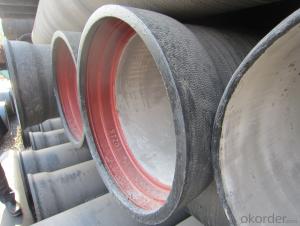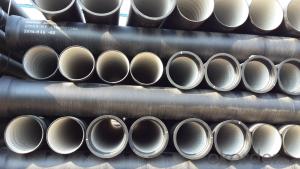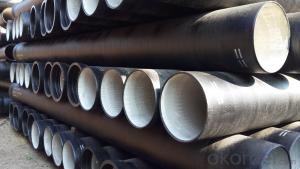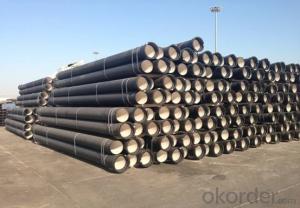DUCTILE IRON PIPE DN100 k
- Loading Port:
- Tianjin
- Payment Terms:
- TT OR LC
- Min Order Qty:
- -
- Supply Capability:
- 30000Tons m/month
OKorder Service Pledge
OKorder Financial Service
You Might Also Like
CNBM ductile iron pipe ranges from DN80-DN1600mm (T-Type, Class K9), effective length 6m, comply with ISO2531 Standard
Company Profile
CNBM International Corporation is the leading production base and renowned supplier of Ductile Iron Water Pipe systems of both potable and waste water in China. We are constantly looking to develop high quality products to ensure the longest service life and wonderful performance.
CNBM Pipelines regard quality as the essential factor leading to successful business. Every pipe is tested in accordance with BS EN545 (water application) or BS EN598 (sewer application). CNBM Pipelines products comply with and are tested according to the relevant European and International Standards. Our pipes are manufactured under the quality management system BS EN ISO 9001. After years of efforts, CNBM Pipelines has built up great reputation in terms of quality and service among customers worldwide
Product Introduction
CNBM ductile iron pipe ranges from DN80-DN1600mm (Tyton, T-Type, Class K7/K8/K9), effective length: 6m, complying with BS EN545/EN598/ISO2531/BS4772.
Specification& Payment terms
Internal lining: Pipes shall have an internal cement mortar lining in acc with ISO4179.
External coating: Pipes shall be externally coated with metallic zinc spray plus a further layer of resin painting to ISO8179.
Gasket: 100% SBR/NBR/EPDM gasket in accordance with ISO4633.
Packing: Pipes from DN100 to DN300 be bundled with steel belts, the others are in bulk.
Payment term: By 30% T/T advance payment + 70% Irrevocable L/C at sight.
Packing: In bulk vessel or in container.
- Q: Can ductile iron pipes be repaired if they are damaged?
- Yes, ductile iron pipes can be repaired if they are damaged. Various repair methods, such as spot repair or full line replacement, can be employed depending on the extent and nature of the damage. Experienced technicians can assess the damage and determine the most suitable repair technique to restore the functionality and integrity of the ductile iron pipes.
- Q: Are ductile iron pipes suitable for horizontal directional drilling (HDD) installations?
- Yes, ductile iron pipes are suitable for horizontal directional drilling (HDD) installations. Ductile iron pipes are known for their strength and durability, making them an excellent choice for HDD projects. HDD involves drilling a horizontal hole underground and pulling a pipe through it, which can be challenging due to the forces exerted on the pipe during installation. Ductile iron pipes can withstand these forces and maintain their structural integrity, ensuring a successful HDD installation. Additionally, ductile iron pipes have excellent corrosion resistance, making them suitable for various soil and environmental conditions encountered during HDD projects. Overall, ductile iron pipes offer the necessary characteristics to withstand the rigors of HDD installations and are a reliable choice for such applications.
- Q: Can ductile iron pipes be used for trench crossings?
- Indeed, trench crossings can utilize ductile iron pipes. Renowned for their remarkable strength and durability, ductile iron pipes prove to be fitting for a diverse array of purposes, including trench crossings. Their capacity to endure substantial burdens and external pressures renders them an optimal selection for subterranean installations. Moreover, ductile iron pipes boast exceptional resistance to corrosion, guaranteeing their enduring and dependable performance in the context of trench crossings.
- Q: How can the internal and external walls of ductile iron pipes be protected from corrosion?
- Internal walls can be painted anti-corrosion paint, exterior anti-corrosion can choose to paint, but also useful anti-corrosion tape, or do 3PE anti-corrosion, look at your anti-corrosion requirements, cost budget and other construction objective conditions.
- Q: Are ductile iron pipes suitable for installation in areas with high traffic loads?
- Yes, ductile iron pipes are suitable for installation in areas with high traffic loads. Due to their inherent strength and durability, ductile iron pipes can withstand heavy loads and are commonly used in applications where there is significant vehicular traffic.
- Q: There are several forms of flexible interfaces for Spigot Cast Iron Pipes
- China's production of "GB 13295-1991 centrifugal casting ductile iron pipe)," GB13294-1991 "provisions of nodular cast iron pipe annealing, centrifugal casting, water for ductile iron pipe pipe, pipe fittings, rubber technical performance, the interface type adopts slip type T shaped interface.
- Q: Can ductile iron pipe be used for hydropower systems?
- Yes, ductile iron pipe can be used for hydropower systems. Ductile iron pipes are known for their strength, durability, and high-pressure capabilities, making them suitable for transporting water in hydropower systems. Additionally, ductile iron pipes have excellent corrosion resistance, which is crucial for long-term use in water-based applications.
- Q: How do ductile iron pipes handle differential settlement?
- Ductile iron pipes are known for their exceptional durability and ability to withstand various environmental conditions, including differential settlement. Differential settlement refers to the uneven settling of the ground, which can often lead to stress and strain on underground pipes. Ductile iron pipes are specifically designed to handle such settlement issues due to their inherent flexibility and strength. These pipes have the ability to flex and accommodate slight ground movements without causing significant damage or failure. The flexibility of ductile iron pipes allows them to distribute the stress and strain caused by differential settlement more uniformly along their length. This feature helps prevent concentrated stress points that could potentially lead to cracks or fractures in the pipe. Additionally, the inherent strength of ductile iron pipes provides them with the necessary resistance to withstand the forces generated by differential settlement. The pipes' robust construction and high tensile strength make them less susceptible to deformation or damage caused by ground movements. Furthermore, ductile iron pipes are commonly installed with flexible joints, such as rubber gaskets or push-on joints. These joints allow for some movement and accommodate any slight misalignment or settlement that may occur. By providing flexibility at the joints, the pipes can better adapt to changes in ground conditions and reduce the risk of failure. In summary, ductile iron pipes are well-equipped to handle differential settlement due to their flexibility, strength, and the use of flexible joints. These features ensure that the pipes can withstand ground movements and continue to function effectively without compromising their integrity or longevity.
- Q: What is the content of silicon in silicon molybdenum ductile iron?
- High silicon molybdenum ductile cast iron is developed for end users successfully reduces the cost, and the castings have high strength, good oxidation resistance, and has good performance under thermal cycling condition. This kind of ductile iron silicon content of 4% molybdenum content 0.6%-0.8%, currently designated as many car manifold and turbocharger shell, and molybdenum content than the silicon alloy casting 1% more for special high temperature exhaust pipe, heat treatment. High silicon molybdenum alloy nodular cast iron castings used in the production of automotive turbocharger.
- Q: Can ductile iron pipes be used for marine applications?
- Ductile iron pipes are indeed applicable for marine uses. Renowned for its robustness and durability, ductile iron proves itself suitable for diverse settings, even marine environments. Its remarkable resistance to corrosion empowers it to endure the severe challenges of saltwater exposure. Furthermore, ductile iron pipes have found utility in marine scenarios such as wastewater treatment facilities, desalination plants, and offshore platforms. Nevertheless, it remains crucial to meticulously contemplate appropriate coating and upkeep practices to optimize the lifespan of ductile iron pipes in marine applications.
Send your message to us
DUCTILE IRON PIPE DN100 k
- Loading Port:
- Tianjin
- Payment Terms:
- TT OR LC
- Min Order Qty:
- -
- Supply Capability:
- 30000Tons m/month
OKorder Service Pledge
OKorder Financial Service
Similar products
Hot products
Hot Searches
Related keywords
